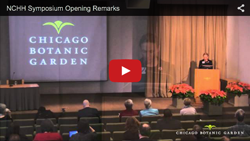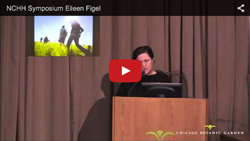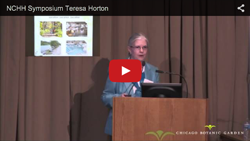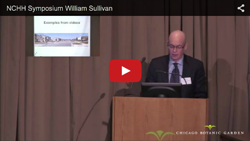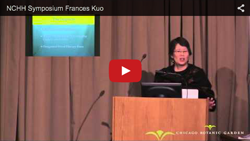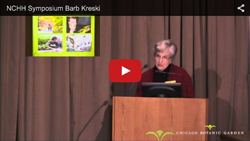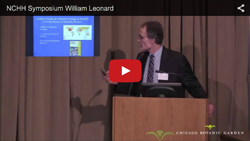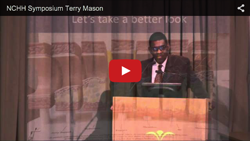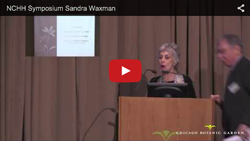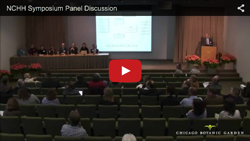Thursday, December 18, 2014
9 a.m. – noon
Alsdorf Auditorium, Regenstein Center, Chicago Botanic Garden
This symposium had multiple objectives. The Forest Preserves of Cook County wants to advance the goal, articulated in its Next Century Conservation Plan, to have many more Cook County residents form strong relationships with nature and experience the many health benefits that come with spending time outdoors. Horticultural Therapy staff of the Chicago Botanic Garden and researchers from Northwestern University and the University of Illinois at Urbana-Champaign are interested in exploring how to get quantitative data on the physical, emotional and even intellectual benefits that interaction with nature affords human beings. It is hoped that this symposium provides a catalyst for further research on the health benefits of nature that will, in turn, support evidence-based recommendations for policy and programmatic decisions. These outcomes would serve the goals of the Next Century Conservation Plan and the broader interests of the medical, planning and design, public garden, and education communities.
9 – 9:05 a.m. Welcome Sophia Shaw, President and CEO, Chicago Botanic Garden
9:05 – 9:10 a.m. Introduction and moderation Greg Mueller, Ph.D., Negaunee Vice President of Science, Chicago Botanic Garden
9:05 – 9:20 a.m. Introduction: The Next Century Conservation Plan Eileen Figel, Forest Preserves of Cook County
The Next Century Conservation Plan aims to make Cook County a national leader in urban conservation. It sets ambitious goals to be implemented over the next 25 years to restore native landscapes, make the preserves more inviting and accessible, demonstrate and expand the economic benefits of the preserves, and ensure that future leaders sustain the focus on conservation and accountability.
9:20 – 9:35 a.m. Where’s the Tree? Identifying the Effects of Nature Teresa H. Horton, Ph.D., Northwestern University
One way to make the Forest Preserves more inviting is by creating programs and policies that educate people about the health benefits of spending time in the preserves. Building those policies and programs is best done on a foundation of solid scientific evidence.
9:35 – 9:50 a.m. If Nature is Medicine, What is the Correct Dose? William C. Sullivan, Ph.D., University of Illinois
Although there is good evidence that exposure to green spaces have wide-ranging positive impacts in individuals and communities, we know precious little about the correct exposure. What dose of nature, in what form, by what route, and at what frequency is necessary?
9:50 – 10:05 a.m. Forest Bathing in the City: Nature, Stress, Immune Functioning, and Health Frances E. “Ming” Kuo, Ph.D., University of Illinois
Seven years ago, Japanese scientists began investigating the impacts of visits to forest preserves on human health, and discovered powerful, lasting effects. Today, “forest bathing” is a popular activity and a recognized part of a healthy lifestyle in Japan. Could the Forest Preserves of Cook County seed such a transformation in Chicago and the United States?
10:05 – 10:20 a.m. Going Wild with Therapeutic Horticulture Barbara Kreski, M.H.S., OTR/L, HTR, Chicago Botanic Garden
Horticultural therapists work to increase people’s well-being by engaging them with the natural world; however much of the work is based on anecdotes and intuition. The Chicago Botanic Garden aims to serve as a laboratory to provide evidence to support programs that are successful and replicable.
10:20 – 10:35 a.m. Break
10:35 – 10:50 a.m. Anthropology: Linking Biology and Culture William R. Leonard, Ph.D., Northwestern University
The transition from a traditional to an urbanized lifestyle is commonly associated with marked increases in chronic health problems, yet the mechanisms behind these changes remain poorly understood. Anthropology’s bio-cultural perspective provides an important framework for understanding how environmental and lifestyle factors interact to shape human health and well-being. This talk offers examples of how collaborative bio-cultural research can be used to explore health changes in different ecological settings.
10:50 – 11:05 a.m. The Role of Plants as a Population Health Strategy Terry Mason, M.D., F.A.C.S., Cook County Department of Public Health
Dr. Mason redefines the leading cause of reported deaths in terms of the true causes and the majors sources of responsible agents. Plant-based diets play a huge role in the reduction of preventable deaths.
11:05 – 11:20 a.m. Childhood and the Development of Cultural Concepts of Nature Sandra Waxman, Ph.D., Northwestern University
Children’s notions about living things are shaped by their culture, language, and day-to-day experiences in the natural world.
11:20 a.m. – noon Moderated Discussion
If you would like to continue the discussion, you are invited to join the Nurture-Nature listserv. E-mail Dr. Horton: Click here to show mail addressto enroll in the listserv.


